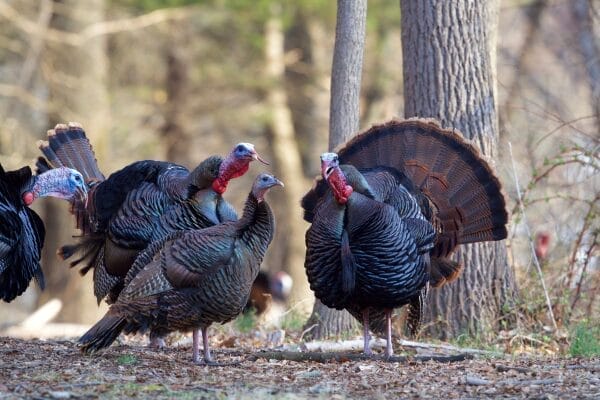Maximizing Your Success During West Virginia’s Spring Turkey Season

Attention all turkey hunters! The spring turkey season in West Virginia is in full swing, having started on April 15th. If you haven’t had a chance to get out in the woods yet, don’t worry – there’s still plenty of time to bag a big tom before the season ends on May 19th. We want to help you make the most of the remaining weeks of the season with some expert tips and gear recommendations.
Adapting to Late-Season Conditions
As the spring gobbler season progresses, weather conditions and turkey behavior can change significantly. Late-season gobblers tend to be more wary and less responsive to calls, making them challenging to locate and hunt. To increase your chances of success, consider the following tips:
- Scout smarter: Focus on areas with good food sources, like green fields and hardwood ridges, where turkeys are likely to feed throughout the day. Pay attention to signs of turkey activity, such as tracks, droppings, and feathers, to help you pinpoint their location.
- Adapt your calling: Use softer, more subtle calls to avoid spooking cautious toms. Soft clucks, purrs, and gentle yelps can be more effective than aggressive cutting and loud gobbling. Remember to vary your calling techniques and be patient, as late-season gobblers may take longer to respond.
- Be stealthy: Late-season turkeys are more alert and sensitive to human presence. Wear appropriate camouflage clothing, minimize movement, and choose your setup location carefully to avoid being detected. Consider using natural blinds or ground blinds to conceal your presence further.
- Hunt midday: As temperatures rise and turkeys become less active during early morning hours, focus your efforts on midday hunting. Gobblers may be more responsive to calls during this time, as they seek out hens for breeding.
Essential Gear for Late-Season Success
Having the right gear can make a significant difference in your success during the late spring gobbler season. Here are some essential items to consider:
- Calls: Experiment with different types of calls, such as box calls, mouth calls, and locator calls, to find what works best for you. Practice your calling techniques regularly to improve your skills and confidence in the field.
- Camouflage: Choose high-quality camouflage clothing that matches your hunting environment. Consider lightweight, breathable fabrics to stay comfortable in warmer late-season conditions. Don’t forget to cover your hands, face, and head to minimize the risk of being spotted by keen-eyed turkeys.
- Decoys: Realistic decoys can help draw in wary gobblers and give you a shot opportunity. Experiment with different decoy setups, such as using a combination of hen and jake decoys, to create a convincing scene. Remember to position your decoys strategically to ensure a clear shot and to avoid spooking approaching turkeys.
- Ammunition: Select high-quality shotgun shells specifically designed for turkey hunting, with a tight shot pattern and ample pellet count to ensure clean, ethical kills. Pattern your shotgun before the season to determine the most effective load and choke combination for your hunting situation.
Safety and Ethics
As with any hunting activity, safety and ethics should always be your top priorities when turkey hunting. Follow these guidelines to ensure a safe and responsible hunting experience:
- Familiarize yourself with and follow all West Virginia turkey hunting regulations, including season dates, bag limits, and licensing requirements.
- Respect private property and always obtain permission before hunting on someone else’s land.
- Practice safe firearm handling at all times, including keeping your gun unloaded and the safety on until you’re ready to shoot. Be sure of your target and what lies beyond before taking a shot.
- Avoid wearing red, white, or blue colors, which can be mistaken for a turkey’s head, and never shoot at movement or sounds alone.
- Properly tag and report your harvested turkey as required by law, and consider donating any excess meat to local food banks or charities.
Sharing Your Experiences
We encourage you to share your success stories, photos, and experiences with the turkey hunting community. Connecting with fellow hunters can help you learn new techniques, discover prime hunting spots, and celebrate the joys of the spring gobbler season together. Consider joining local hunting clubs, participating in online forums, or attending turkey hunting events to expand your network and knowledge.
Remember, the spring turkey season is a time to enjoy the great outdoors, test your skills, and immerse yourself in the thrill of the hunt. Whether you bag a big tom or simply enjoy the sights and sounds of the forest, every moment spent in the woods is a valuable experience.
As you prepare for your late-season turkey hunting adventures, don’t hesitate to reach out to experienced hunters, wildlife biologists, or local conservation organizations for additional tips and advice. By continually learning and refining your techniques, you’ll be well on your way to becoming a successful and ethical turkey hunter.
We hope these tips and recommendations help you make the most of the remaining weeks of the spring turkey season in West Virginia.
Stay safe, have fun, and happy hunting!


